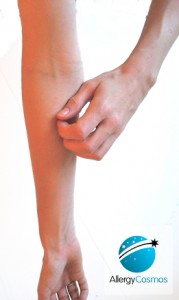Many people in the UK suffer from eczema. It affects between 2 and 10% of adults and up to 15% of school-age children. But how do you know it is eczema and not just 'dry skin'? What are the symptoms of eczema? Eczema is a skin irritation, which usually causes intense itching - its hallmark symptom. The word eczema actually comes from the Greek word meaning 'boiling'; this is a good way of describing the blisters that often erupt beneath the inflamed skin of someone with eczema. The terms dermatitis (literally, 'skin inflammation') and eczema are often used interchangeably by dermatologists.
The best-known form of eczema (there are many different diagnoses) is atopic eczema, which is caused by an allergic response to a specific substance, like house dust mite, certain foods or pollen. Atopic eczema is most common among children and seems to run in families. Only a small proportion of those affected by atopic eczema as a child still suffer from the condition in adult life and, contrary to parents' fears, there is usually no lasting damage to the skin. Typically - but not always - the condition starts between three and six months, and begins to fade by age three.
We carried out a survey of our regular site visitors regarding eczema. Here is what some of you had to say:
"My two-year-old is the one with eczema. He was born with it on just his hands. At age two months, it was on his face and by the time he was six months, it affected his entire body. Today he is a lot better. He still has eczema but his face and torso are clear. His only problem areas are the limbs."
Florence
"My eczema became noticeable when I was in high school. The amount of stress from my schoolwork gave me itchy skin and was unbearable. There would be red patches on the insides of my elbows and behind my knees."
Karen, 27
"It first began when I was only three months old; it was awful when I was a child and it has come down to being only mild with a few flare-ups at my young age of 15."
Sarah, 15
"My son started getting eczema when he was about two years old …and it went undiagnosed for about two years. At six years old, he only gets bad flare-ups in winter."
Tricia
"It started 20 years ago when I was six and I was on the beach. I had a problem with my feet and then eczema appeared."
Monica, 26
As you can see, eczema is very much an individual thing - although there are common patterns. Where eczema persists into later childhood and adult life, it tends to follow a relapsing and remitting course for many years. The typical symptom of eczema is a 'weeping' itchy rash and redness of the skin. Inflammation in the deeper layers of skin causes fluid to leak from underlying blood vessels and this 'bubbles' up to form fluid-filled blisters just beneath the surface. The natural response to an itch is to scratch it (however hard you try not to!). The scratching breaks the surface of the blisters and so the rash starts to 'weep'.
The rash can occur on any part of the body but is most commonly seen on the face, hands, elbows, wrists, buttocks, and knees and in folds of the skin. Scratching may cause the skin to bleed and the damage gives it a scaly appearance in the long run. Broken skin tends to dry out and is also more prone to infection. People with eczema often have very dry and thickened skin and lack the natural sheen of healthy skin. The skin's appearance in eczema can cause a lot of distress, especially in older children and adults, but there is rarely any permanent scarring.
Here is what some of you had to say about living with eczema:
"It's important to avoid any substance that you know triggers eczema - whether it's eggs or milk in the diet, exposure to soap or biological detergent or even stress in your life."
John
"The changes in the weather usually affect my son's eczema. Also, different environments. I had to take him out of daycare because the center installed new carpeting which affected his eczema. We don't go to many social gatherings because of the different perfumes which irritate him, as well as people thinking they are being kind by giving my child something he is allergic to."
Florence
"Keep away from stress areas in your life!"
Sarah, 15
"Avoid chlorine."
Tricia
"I know if I can keep the stresses out of my life, my hands are better. I also try not to handle onions, potatoes, or tomatoes with bare hands."
Anon




